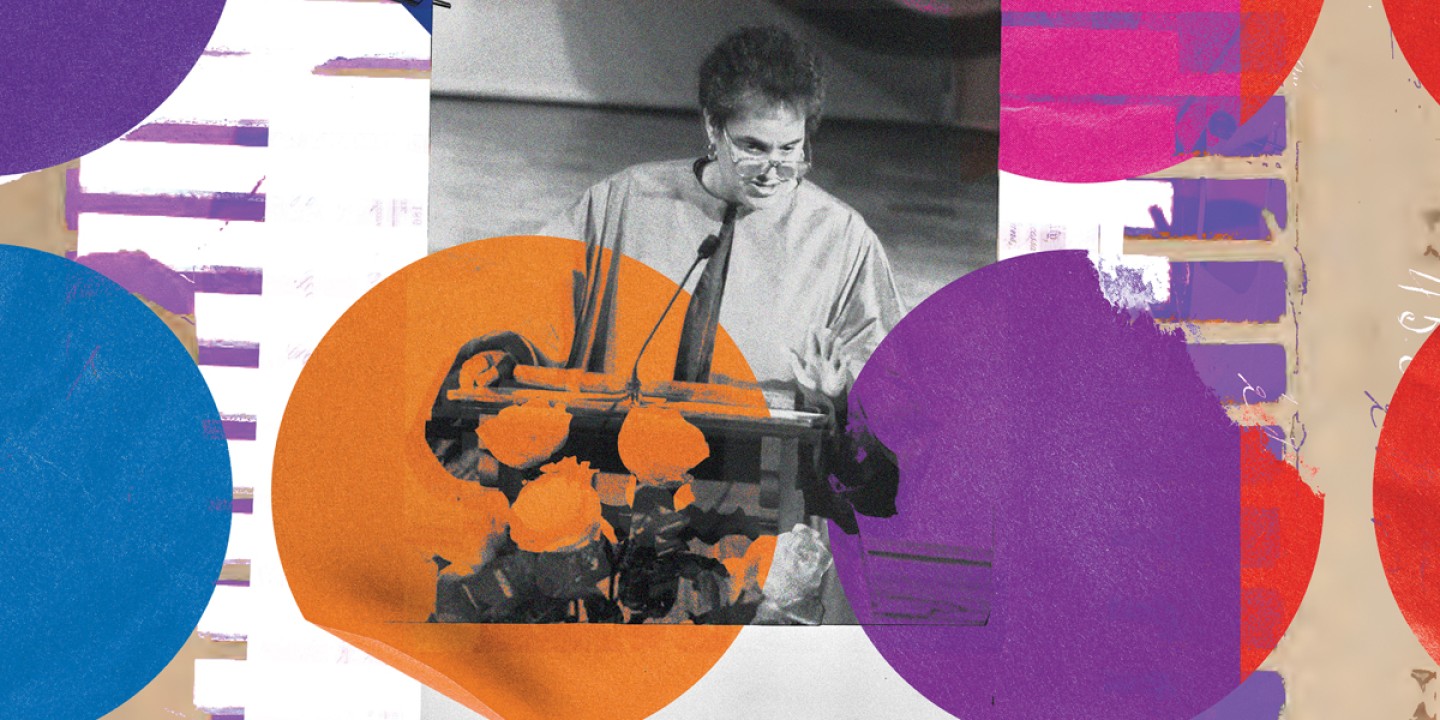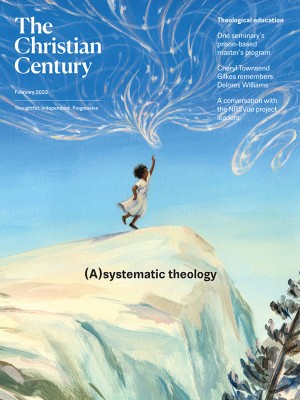Delores Williams’s voice in the wilderness
At her funeral, I gathered with scholars, family, and friends to celebrate the womanist theologian’s world-changing gifts.

Delores Seneva Williams’s pallbearers were listed simply as “Womanists.” On December 10, Black women scholars inspired and shaped by the theologian’s leadership and friendship came to Nashville to celebrate her life. They processed with her family and, after quick instructions from the funeral director, lifted her casket and placed it in the hearse that would carry her body to its final resting place in Louisville.
Like so much of Williams’s life, this unusual and precious moment was a first for all involved. Those of us who had made our way from New York, New England, Chicago, Atlanta and other places came to let her family and friends know that sharing her intellectual and spiritual gifts with the rest of us had made a world-changing difference. We wanted to rise up, stand with them, and “call her blessed,” in the words of the writer of Proverbs 31:28.
Read our latest issue or browse back issues.
In the Black church, when a good woman joins the ancestors, family and pastors are often tempted to go straight to Proverbs 31 and its celebration of an overworked, high-energy, hetero-normative, cis-gender, wealth-building wife and mother whose patriarchy-complicit efforts supported her husband’s role in an Iron Age ruling class. Williams’s children wanted to choose readings for her “celebration of life” that moved beyond old church tropes and reflected her life’s work. We were not going to look to Proverbs 31 for a reading. But we did rise up during the service to cheer and shout and to affirm the many wonderful ways Williams touched and transformed our lives.
Nor did we want to approach the occasion with an act of biblical gender segregation, by finding a particular biblical woman who seemed to fit Williams’s unique life. Williams’s work engaged the idea of wilderness, and womanist/feminist readings of the Bible—highly influenced by the challenges embedded in her theology—pressed our imaginations to look instead to how women, named and unnamed, have worked with God in the wildernesses of human history. We needed to return to the wilderness where Williams highlighted God’s work.
“Her voice calls out to us in the wilderness.” Ethicist Stacey Floyd-Thomas did a reading from Isaiah 40, and in the translation she chose, verse 3 reflected the gift of Williams’s life, leadership, scholarship, and voice for all of us present. The voice of the prophet of the exile reminded us that the voice of the one crying or calling in the wilderness is a voice that is instrumental in preparing human history for the presence of God. For Williams, that wilderness work was African American women’s experience and its message for the world as a principal and powerful resource for a theology of liberation and survival. One family member, describing her childhood, called her a “watcher,” a term sometimes used in the Bible for prophets.
Williams brought her gifts as a poet and journalist to theological studies. “Her theological voice had an edge to it,” theologian James Cone writes in his memoir, Said I Wasn’t Gonna Tell Nobody, “and her intellectual power was developing into a force with which black theology would have to reckon.” Cone acknowledges that he “didn’t have the experience or knowledge to really hear what I needed to hear. Williams, who later joined the Union [Theological Seminary] faculty, argued that neither the paradigms of white feminist theology nor the liberation theme of black (male) theology adequately spoke to the experience of African American women.”
Williams’s critical work and her 1993 book Sisters in the Wilderness: The Challenge of Womanist God-Talk, which Cone calls “ground-breaking,” made abundantly clear to Cone and the rest of us that “liberation is a deeply problematic theme, with many ethical and religious contradictions. Although it’s a prominent biblical theme, I now saw . . . its ambiguities.” Drawing on women’s experience and folk traditions as sources for theology, Williams pointed to the ways that Black male liberation theologians did not address Black women. For Williams, the ethical task of the Black female liberation theologian is to reconstruct and redeem from invisibility the life-world of African American women.
I first saw Delores Williams during an altar call at St. Paul AME Church in Cambridge, Massachusetts, and I first met her, that same week, in the hallway of Boston University’s school of theology. I’m not certain, but it was probably the fall semester of 1980. She was director of the Anna Howard Shaw Center, and in that capacity she taught BU’s very first course on Black theology. She walked us through the foundations of Cone’s thinking in the work of Karl Barth and then through Cone’s work and that of related writers at that moment. Ms. Williams—not yet doctor or professor—and I became fast friends. By that spring, my new friend recognized the challenges I faced—as a tenure-track sociology professor, a seminarian, and a Baptist minister-in-training—and she was determined to help.
As a sister-friend and leader-friend, Delores was a force of nature. I sometimes tell people that James Cone changed the course of the river of my life, and Delores Williams hopped in the boat and steered.
One particularly memorable act of friendship involved her taking charge and guiding me through a 1981 speaking invitation in New York City when she recognized that I had no clue how to even get to the event. After that, Delores and I shared a personal and professional friendship. Until her 2004 retirement, we moved through a variety of conferences and meetings where I was able to hear her amazing creativity as she produced “womanist God-talk” and to witness her collaboration and conversation with fellow theological builders such as Jacquelyn Grant, Beverly Wildung Harrison, Renita Weems, Kelly Brown Douglas, and Katie Geneva Cannon.
In 1983, writer Alice Walker formulated a definition for her neologism “womanist,” an idea grounded in an African American folk expression evincing concern for adolescent girls—“acting womanish.” Williams pioneered the use of the womanist idea in theology, ethics, and a range of religious studies. She famously grounded her womanist work in the experience of an African American woman shopping for a beautiful dress at a fine store. The dress was a size 6 and our shopper, a size 18, admired it but observed that the dress simply did not have enough material in it to make it ever fit her. Neither did White feminism—but the womanist idea contained more material to fit the challenges of African American women as they sought survival and liberation.
Williams revolutionized theological thinking about African American women by utilizing the stories of Hagar, especially in the wilderness. I first heard the intellectual work that became Sisters in the Wilderness in a 1983 banquet address at Princeton Theological Seminary. Two PTS doctoral students, Weems and Prathia Hall Wynn, organized a conference on Black women in ministry. Williams’s presentation on Hagar in the wilderness was so powerful that it inspired an equally powerful sermon delivered that night by Arlene Churn. Five years later Weems published Just a Sister Away: A Womanist Vision of Women’s Relationships in the Bible. That banquet presentation , which culminated in Williams’s now classic 1993 book, was a significant voice in the consciousness of Black women in ministry. Several women whose voices are now considered paradigmatic in the African American preaching tradition were present at this conference, which became a significant turning point for women in ministry in the Black church.
Williams, Cannon, and Grant were the first three Black women to earn PhDs at Union in systematic theology and ethics. They became the founders of womanist theology and ethics. Decades later at Williams’s funeral, Grant observed that multiple generations of womanist scholars in theology, ethics, biblical studies, and related disciplines still attest to the enduring value of the “liberating biblical interpretations and penetrating social justice analysis for the uplifting of Black womanhood” found in Sisters in the Wilderness. By revealing the “divine agency of Hagar,” Grant said, Williams reveals “liberative narratives” that are “relevant to poor, captive, violated, and ostracized Black women” and inspires us “to claim our own freedom, heritage, legacy, and, indeed, divinity.”
Williams’s paradigm-shifting intellectual work offers more than enough material to fill a book. But her life was a vital tapestry of many rich threads. Her friends and family members point out that she was born with a special sense and vision that suffused all the many roles she played. After her marriage in 1958, Delores acquired her bachelor’s and master’s degrees. She and her philosopher husband, Robert C. Williams, were parents to four precocious and energetic children. They were a model of what we now call dual-career professional families. When her husband died suddenly in 1987, Delores became a single parent.
A theologian friend of mine, admiring Delores’s grown children, demanded to know how she accomplished all this. She responded, “Just keep talking to them. You’ve got to keep talking to them!” Delores later told me, “We Black women raise our children with sermons.” My friend said Delores’s child-raising advice worked. Her voice and her child care advice were always in my own head when caring for my godchildren when they were young.
Agency and direct engagement with the divine in the wilderness are central to Williams’s womanist lens. “Delores loved God!” her student Anne Elliott said at the funeral. “That woman’s faith in God was bottomless, and she went to the well all of the time!” Famous for her criticisms of aspects of Christian doctrine, especially traditions around atonement and the cross, Williams focused on Jesus’s ministerial vision and the resurrection—for Black women, there has to be a hope beyond suffering and death.
At her funeral we highlighted the incarnational vision at the heart of her theology as well as her personal faith. Along with the Isaiah text we chose Jesus’s conversation with Martha at the tomb of Lazarus, in which Jesus declares, “I am the resurrection and the life” (John 11:25). After the sudden loss of her husband, Delores’s God-with-us-like-with-Hagar faith kicked in. She left me a voicemail saying, “All I can do is to grab a hold of God’s hand and keep on running!”
Williams was, in Renita Weems’s words at the service, “a woman with a piercing, beautiful mind.” She was also, according to Weems, like civil rights leader Ella Baker, who said, “I’m a woman with a voice, and I must be heard.” When I was in Delores’s presence, I was privileged to hear her thinking out loud in that beautiful, cultured Kentucky voice.
Repeatedly I heard her say, “We have wearied ourselves and traveled a hard road.” I was sure that she was quoting the Bible and I would sometimes look for these words in various biblical translations. I now realize that the reason she sounded like a biblical prophet was that she was, like the prophets, a special voice stationed at a critical point in the wilderness of human history—in human theo-history—at which God’s voice must be heard and heeded.
Our precious memories of Delores Williams will be an enduring source of inspiration, creativity, and prophetic challenge as we answer her call, in Sisters in the Wilderness, to do “with God’s help” the wilderness work of liberation and survival, to “make a way out of no way,” in order to foster the emergence of a “God-full presence” that is “quickening the heart, measuring the soul, and bathing life with the spirit.”





